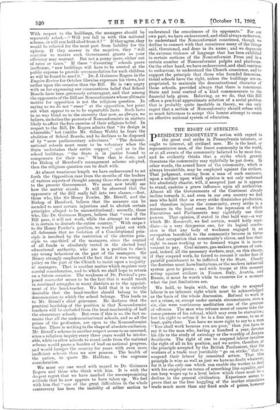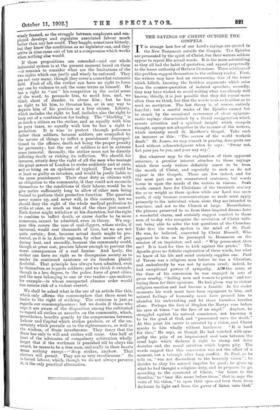THE RIGHT OF STRIKING.
PRESIDENT ROOSEVELT'S action with regard to the great coal strike in Pennsylvania interests, or ought to interest, all civilised men. He is the head, or representative man, of the freest community in the world, or at all events of the community believed to be most free, and he evidently thinks that a strike which gravely threatens the community may rightfully be put down. In other words, the armed force of the community, which is always irresistible, may be employed against the strikers. That judgment, coming front a man of such eminence, upon a subject upon which opinion is not only unformed but absolutely chaotic, will, if accepted just as it appears to stand, exercise a grave influence upon all authorities. Almost all the Governments of the Continent already incline towards it, and even in our own country we find men who hold that as every strike diminishes production, and therefore injures the community, every strike is a nuisance in the legal sense, for the repression of which Executives and Parliaments may iightfully use their powers. That opinion, if stated in that bald way—a way which Mr. Roosevelt, we feel certain, would hotly repu- diate—is a very dangerous one, for its logical conclu- sion is that any body of workmen engaged in an occupation beneficial to the community become in virtue of that occupation that community's slaves, and lose their right to cease working or to demand wages it is incon- venient to pay. Coal-miners, gas-makers, growers of corn, and, indeed, all the necessary workers, may, on this theory, if they suspend work, be forced to resume it under fear of painful punishment to be inflicted by the State. Clearly the doctrine must have limitations, or the modern industrial system goes to pieces ; and with troops at this moment acting against strikers in France, Italy, Austria, and Russia, it must be worth while to examine for a moment what the just limitations are.
We hold, to begin with, that the right to suspend labour is an inherent right which must be acknowledged as the basis of the whole discussion. Refusal to work is not a crime, or, except under certain circumstances, even a sin, else were continuous meditation one of the greatest of offences. The man who refuses must of course take the consequences of his refusal, which may even be starvation; but his right to refuse if he is a free man seems, to us at least, quite clear. You have no more right to say to a man "You shall work because you are poor," than you have to say it to the man who, having a hundred a year, devotes his life to the study of astrology or the worship of Joanna Southcote. The right of one to suspend labour involves the right of all in his position, and we arrive, therefore, at the principle accepted by the British Parliament, that the workers of a trade may justifiably "go on strike," that is. suspend their labour by concerted action. That this principle is wise as well as just we have no doubt whatever, for it is the only one which can enable the worker to deal with his employer on terms of something like equality, and can keep wages up to a level below which there must be a decline in the general civilisation. Experience seems to prove that as the free haggling of the market stimulates trade much more than any fixed scale of prices, however wisely framed, so the struggle between employers and em- ployed develops and regulates associated labour much bett,er than any law could. They haggle, sometimes bitterly, but they know the conditions as no legislator can, and they arrive in nine cases out of ten at a compromise which works when nothing else would.
If those propositions are conceded—and our whole industrial system is at the present moment based on them —it remains to consider what are the limitations of the two rights which can justly and wisely be enforced. They are not very many, though they cover a somewhat extensive field. First of all, the striker can have no right to force any one by violence to ask the same terms as himself. He has a right to " cut " his competitor in the social sense of the word, to persuade him, to scold him, and, we think, short of slander, to abuse him ; but he has no right to hit him, to threaten him, or in any way to deprive him of his position as a free citizen. Liberty, which includes the right to leaf, includes also the right to keep out of a combination for loafing. The " blackleg " is as much a citizen as the striker, and as equally with him he pays taxes, so equally with him he has a right to protection. It is wise to protect through policemen rather than soldiers, because soldiers are compelled by the nature of things to inflict a punishment dispropor- tioned to the offence, death not being the proper penalty for perversity ; but the use of soldiers is not in extreme cases immoral. Secondly, the striker must not be directly inflicting death or risking its infliction. We should, for instance, utterly deny the right of all the men who manage the great sewers of London to strike suddenly and at once, and so bring on an epidemic of typhoid. They would be at least as guilty as invaders, and would be justly liable to the same punishment. Their clear duty as citizens with an obligation to the community, if they could not reconcile themselves to the conditions of their labour, would be to give notice sufficiently long to allow of other men being trained to perform their protective function. The question never comes up, and never will, in this country, but we should deny the right of the whole medical profession to strike at once, as much as that of the class just named. Each doctor might withdraw at his discretion, but the right to combine to inflict death, or cause deaths to be more numerous, cannot be admitted, even in theory. We sup- pose this covers the case of coal-diggers, whose strike, if universal, would cost thousands of lives, but we are not quite certain ; first, because actual death might be pre- vented, as it is in Arctic regions, by other means of pro- ducing heat, and secondly, because the community could, though at great cost, procure labour enough to prevent the worst consequences of a coal' famine. And lastly, the striker can have no right so to disorganise society as to render its continued existence or its freedom plainly doubtful. That principle has always been admitted, even by themselves, as regards soldiers; and we think it extends, though in a less degree, to the police force of great cities, and the men belonging to one or two trades—gas-makers, for example—in Chose unexpected absence order would run serious risk of a violent overset.
We shall be asked what is the use of an article like this, which only affirms the commonplace that there must be limits to the right of striking. The criticism is just as regards our commonplaceness ; but we doubt if those who urge it are aware of the disposition among the cultivated to regard all strikes as assaults on the community, which, nevertheless, benefits greatly by the compromises between Labour and Capital which strikes produce, or of the un- certainty which prevails as to the righteousness, as well as the wisdom, of State interference. They fancy that the State has only to will and strikes will cease. One half at least of the advocates of compulsory arbitration wholly forget that if the workman is punished till he obeys the award, he ceases to be a free man, and really in their hearts mean nothing except—" Stop strikes, anyhow. That electors will permit. They are so very troublesome." So is forced labour, which, though we do not always perceive is the only practical alternative.











































 Previous page
Previous page